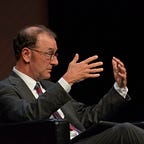Sustainable funds are weathering the coronavirus correction better than most funds
With the coronavirus correction a week old, investors may be wondering how sustainable investing strategies are handling the downturn. At the Burridge 2020 Conference on Sustainable Investing last week, sponsored by the University of Colorado Leeds School of Business, at least some were wondering whether a prolonged pullback would stifle investor interest in sustainable investing.
I’ve heard this concern before. Because most of the growth of sustainable investing has taken place since the financial crisis, much of it in the past five years, many ESG strategies are largely untested in market corrections. In a bullish environment, ESG performance has been good and investors appreciate the added social and environmental impact generated. But when the rubber meets the road during market declines, will investors resort to traditionally defensive investments and no longer prioritize investing for impact if they aren’t also getting the financial return?
Based on how sustainable equity funds fared last week, which resulted in the biggest downturn since 2008, concerns over performance of ESG funds in down markets appear to be unfounded. Sustainable equity funds overall fared better than their conventional peers, and passive sustainable equity funds fared better than those following conventional market indexes.
First, I compared the one-week returns of all 201 sustainable equity open-end and exchange-traded funds available in the U.S. with their peer groups for the Feb. 24-Feb. 28 period, and made the same comparison for the year to date through Feb. 28. For peer groups I used Morningstar categories, which bucket funds based on region, market cap, and style, and contain both sustainable and conventional funds.
So far, sustainable equity funds have weathered the downturn better than equity funds overall. Over the week of Feb. 24-Feb. 28, the returns of 58% of sustainable equity funds ranked in the top half of their respective Morningstar categories. Nearly one third (32%) ranked in their category’s top quartile while only 19% ranked in their category’s worst quartile. (By definition, 25% of all the funds in each category place in each of four quartiles. Sustainable funds are thus overrepresented in the top quartiles and top halves of their peer groups relative to funds overall.)
Broadening the perspective to the year through Feb. 28, the returns of nearly two thirds (65%) of sustainable equity funds ranked in their category’s top half. The returns of 43% ranked in their category’s top quartile while only 10% landed in their category’s worst quartile.
Second, I compared the returns of passive ESG funds with those of conventional index funds covering U.S. stocks (S&P 500), non-US developed-market stocks (MSCI EAFE), and emerging-markets stocks (MSCI Emerging Markets). Across all three regions, ESG indexes held up better than funds tracking the conventional indexes from Feb. 24-Feb. 28 and for the first two months of 2020.
Of the dozen passive ESG funds found in the Morningstar Large Blend category, 8 of 12 performed better than the iShares Core S&P 500 (IVV) for the week ending Feb. 28 and one matched IVV’s return. For the year through February, all 12 passive ESG funds have outperformed IVV.
Of the 11 passive ESG funds found in the Morningstar Foreign Large Blend category, all outperformed iShares Core MSCI EAFE (IEFA) for the week ending Feb. 28 and for the year through February.
Of the three passive ESG funds found in the Morningstar Diversified Emerging Markets category, all outperformed iShares Core MSCI Emerging Markets ETF (IEMG) for the week ending Feb. 28 and for the year through February.
We don’t know, of course, how long the coronavirus correction will last, and obviously, ESG equity funds cannot escape losing money when stocks are in correction territory. But sustainable funds are weathering this downturn better than their conventional peers.
